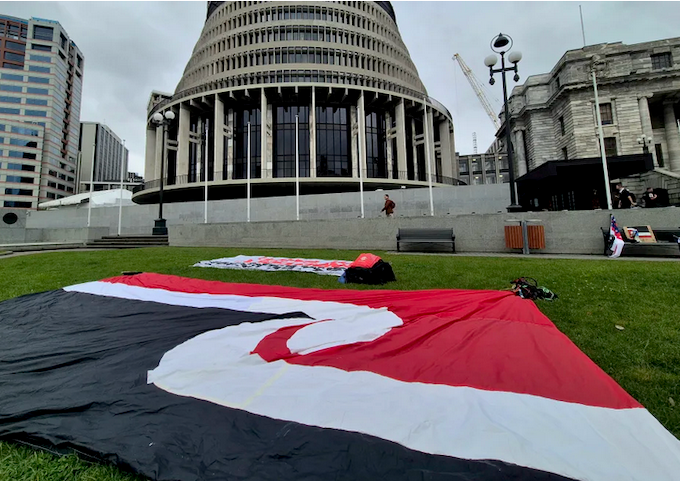
By Layla Bailey-McDowell, RNZ Māori news journalist
Legal experts and Māori advocates say the fight to protect Te Tiriti is only just beginning — as the controversial Treaty Principles Bill is officially killed in Parliament.
The bill — which seeks to redefine the principles of Te Tiriti o Waitangi — sparked a nationwide hīkoi and received more than 300,000 written submissions — with 90 percent of submitters opposing it.
Parliament confirmed the voting down of the bill yesterday, with only ACT supporting it proceeding further.
- READ MORE: The Treaty Principles Bill : Here’s what’s in it
- The Regulatory Standards Bill: What you need to know
- What you need to know about Māori wards
- Māori ward councillors prepare for election and referendum
The ayes were 11, and the noes 112.

Riana Te Ngahue, a young Māori lawyer whose bite-sized breakdowns of complex issues — like the Treaty Principles Bill — went viral on social media, said she was glad the bill was finally gone.
“It’s just frustrating that we’ve had to put so much time and energy into something that’s such a huge waste of time and money. I’m glad it’s over, but also disappointed because there are so many other harmful bills coming through — in the environment space, Oranga Tamariki, and others.”
Most New Zealanders not divided
Te Ngahue said the Justice Committee’s report — which showed 90 percent of submitters opposed the bill, 8 percent supported it, and 2 percent were unstated in their position — proved that most New Zealanders did not feel divided about Te Tiriti.
“If David Seymour was right in saying that New Zealanders feel divided about this issue, then we would’ve seen significantly more submissions supporting his bill.
“He seemed pretty delusional to keep pushing the idea that New Zealanders were behind him, because if that was true, he would’ve got a lot more support.”
However, Te Ngahue said it was “wicked” to see such overwhelming opposition.
“Especially because I know for a lot of people, this was their first time ever submitting on a bill. That’s what I think is really exciting.”
She said it was humbling to know her content helped people feel confident enough to participate in the process.
“I really didn’t expect that many people to watch my video, let alone actually find it helpful. I’m still blown away by people who say they only submitted because of it — that it showed them how.”
Te Ngahue said while the bill was made to be divisive there had been “a huge silver lining”.
“Because a lot of people have actually made the effort to get clued up on the Treaty of Waitangi, whereas before they might not have bothered because, you know, nothing was really that in your face about it.”
“There’s a big wave of people going ‘I actually wanna get clued up on [Te Tiriti],’ which is really cool.”
‘Fight isn’t over’
Māori lawyer Tania Waikato, whose own journey into social media advocacy empowered many first-time submitters, said she was in an “excited and celebratory” mood.
“We all had a bit of a crappy summer holiday because of the Treaty Principles Bill and the Regulatory Standards Bill both being released for consultation at the same time. A lot of us were trying to fit advocacy around summer holidays and looking after our tamariki, so this feels like a nice payoff for all the hard mahi that went in.”

She said the “overwhelming opposition” sent a powerful message.
“I think it’s a clear message that Aotearoa as a whole sees Te Tiriti as part of this country’s constitutional foundation. You can’t just come in and change that on a whim, like David Seymour and the ACT Party have tried to do.
“Ninety percent of people who got off their butt and made a submission have clearly rejected the divisive and racist rhetoric that party has pushed.”
Despite the win, she said the fight was far from over.
“If anything, this is really just beginning. We’ve got the Regulatory Standards Bill that’s going to be introduced at some point before June. That particular bill will do what the Treaty Principle’s Bill was aiming to do, but in a different and just more sneaky way.
‘The next fight’
“So for me, that’s definitely the next fight that we all gotta get up for again.”
Waikato, who also launched a petition in March calling for the free school lunch programme contract to be overhauled, said allowing the Treaty Principles Bill to get this far in the first place was a “waste of time and money.”
“Its an absolutely atrocious waste of taxpayers dollars, especially when we’ve got issues like the school lunches that I am advocating for on the other side.”
“So for me, the fight’s far from over. It’s really just getting started.”

ACT Party leader David Seymour continued to defend the Treaty Principles Bill during its second reading on Thursday, and said the debate over the treaty’s principles was far from over.
After being the only party to vote in favour of the bill, Seymour said not a single statement had grappled with the content of the bill — despite all the debate.
Asked if his party had lost in this nationwide conversation, he said they still had not heard a good argument against it.
‘We’ll never give up on equal rights.”
He said there were lots of options for continuing, and the party’s approach would be made clear before the next election

Eyes on local elections – ActionStation says the mahi continues
Community advocacy group ActionStation’s director Kassie Hartendorp, who helped spearhead campaigns like “Together for Te Tiriti”, said her team was feeling really positive.
“It’s been a lot of work to get to this point, but we feel like this is a very good day for our country.”
At the end of the hīkoi mō Te Tiriti, ActionStation co-delivered a Ngāti Whakaue rangatahi led petition opposing the Treaty Principles Bill, with more than 290,000 signatures — the second largest petition in Aotearoa’s history.
They also hosted a live watch party for the bill’s second reading on Facebook, joined by Te Tiriti experts Dr Carwyn Jones and Tania Waikato.
Hartendorp said it was amazing to see people from all over Aotearoa coming together to reject the bill.
“It’s no longer a minority view that we should respect, but more and more and more people realise that it’s a fundamental part of our national identity that should be respected and not trampled every time a government wants to win power,” she said.
Looking to the future, Hartendorp said Thursday’s victory was only one milestone in a longer campaign.
Why people fought back
“There was a future where this bill hadn’t gone down — this could’ve ended very differently. The reason we’re here now is because people fought back.
“People from all backgrounds and ages said: ‘We respect Te Tiriti o Waitangi.’
“We know it’s essential, it’s a part of our history, our past, our present, and our future. And we want to respect that together.”
Hartendorp said they were now gearing up to fight against essentially another version of the Treaty Principles Bill — but on a local level.
“In October, people in 42 councils around the country will vote on whether or not to keep their Māori ward councillors, and we think this is going to be a really big deal.”
The Regulatory Standards Bill is also being closely watched, Hartendorp said, and she believed it could mirror the “divisive tactics” seen with the Treaty Principles Bill.
“Part of the strategy for David Seymour and the ACT Party was to win over the public mandate by saying the public stands against Te Tiriti o Waitangi. That debate is still on,” she said.
This article is republished under a community partnership agreement with RNZ.






































